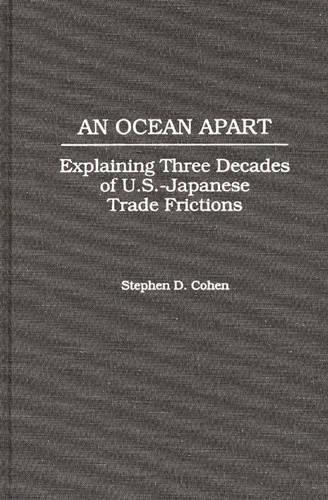
An Ocean Apart: Explaining Three Decades of U.S.-Japanese Trade Frictions
(Hardback)
Publishing Details
An Ocean Apart: Explaining Three Decades of U.S.-Japanese Trade Frictions
By (Author) Stephen D. Cohen
Bloomsbury Publishing PLC
Praeger Publishers Inc
30th January 1998
United States
Classifications
Tertiary Education
Non Fiction
International relations
Right-of-centre democratic ideologies and movements
Cultural studies
382.0952073
Physical Properties
Hardback
272
Description
Closing a critical gap in the literature examining the strained relationship between the U.S. and Japan, this book synthesizes the economic, political, historical, and cultural factors that have led these two nations, both practitioners of capitalism, along quite different paths in search of different goals. Taking an objective, multidisciplinary approach, the author argues that there is no single explanation for Japan's domestic economic or foreign trade successes. Rather, his analysis points to a systemic mismatch that has been misdiagnosed and treated with inadequate corrective measures. This systemic mismatch in the corporate strategy, economic policies, and attitudes of the U.S. and Japan created and is perpetuating three decades of bilateral economic frictions and disequilibria. As long as both the U.S. and Japan deal more with symptoms than causes, bilateral problems will persist. This book's unique analysis will encourage a better understanding on both sides of the Pacific of what has happened, is happening, and will continue to happen if corporate executives and policymakers in the two countries do not better realize the extent of their differences and adopt better corrective measures.
Reviews
"Professor Cohen provides a welcome broad perspective on the murky world of U.S.-Japan trade relations, nicely incorporating a variety of academic disciplines, from economics to sociology. But beware--whatever your own stereotypes about Japan and the bilateral relationship, and whatever the conclusions of your own academic discipline, he will challenge your views and make you think hard about what to believe. This is serious analysis from someone with no personal axe to grind."-Edward J. Lincoln Senior Fellow, The Brookings Institution
"Stephen Cohen writes, 'A country-specific, modified U.S. trade policy to directly address Japan's unique economic and social factors makes more sense than a universal trade policy mechanically and identically applied to every trading partner.' Amen. Those of us whom the Japanese government denounced as revisionists and Japan-bashers have been saying this for more than 15 years, but economic ideology rather than economic intelligence has prevailed. The United States still has no economic policy toward East Asia, only an antedated military stance left over from the Cold War. As economic crises develop in the region, the United States's response is increasingly one of armed impotence. To understand the critically important issues involved, Cohen's book is the place to start."-Chalmers Johnson President, Japan Policy Research Institute
A specialist on international economic affairs with an appreciation of the value of historical context, Cohen writes clearly, without jargon. Historians will have no trouble following his arguments.-The International History Review
What sets Cohen apart from this prior scholarship is not an ocean of difference, perhaps, but a sincere willingness to document painstakingly decades of debate on the subject....Cohen's careful survey will be a useful resource.-Pacific Affairs
"A specialist on international economic affairs with an appreciation of the value of historical context, Cohen writes clearly, without jargon. Historians will have no trouble following his arguments."-The International History Review
"What sets Cohen apart from this prior scholarship is not an ocean of difference, perhaps, but a sincere willingness to document painstakingly decades of debate on the subject....Cohen's careful survey will be a useful resource."-Pacific Affairs
Author Bio
STEPHEN D. COHEN is Professor of International Relations at the American University's School of International Service in Washington, D.C. His earlier books include The Making of U.S. International Economic Policy: Principles, Problems, and Proposals for Reform (4th ed., Praeger, 1994) and Fundamentals of U.S. Foreign Trade Policy: Economics, Politics, Laws, and Issues (1996).
